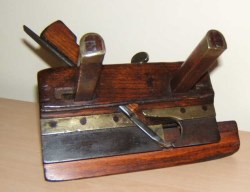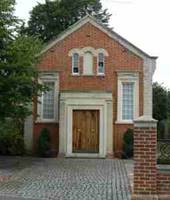William Ely
William Ely was a name well known to
Victorian inhabitants of Southminster.
Father and son maintained the
wheelwrights store in High Street for nearly 100 years.
From this base they provided
the normal wheelwright service as well as coach building, carpentry
and agricultural implements.
William Ely Senior
William Ely Senior was born
at Southminster in 1785
He married Mary Ann (also
recorded as Marianne) and they had two children Harriet and William
both born in 1825.
William lived
in Munsons which was one of the best houses in High Street with
gardens that extended as far as Pump Mead Close.
He ran the wheelwrights store
just along the road on a site opposite Queenborough Road which is
now a row of modern shops.
William worked closely with
the village blacksmith to provide a service to the farming community
as well as the growing number of people able to afford pony traps or
grander carriages.
Construction of wheels was
very technical as there was a need to ensure that wheels were
perfectly balanced providing smooth running of the carriage.
 A
wooden carriage wheel in construction -
photo courtesy of wikimedia commons
A
wooden carriage wheel in construction -
photo courtesy of wikimedia commons
William extended the business
by making agricultural machines such as harrows as well as
carriages.
Mass produced agricultural
machinery was not available in this era.
Items such as ploughs
complied with basic specifications but most would contain
modifications to meet the needs of individual framers.
The Ely's quickly moved into
design and build of various horse drawn agricultural implements such
as harrows, ploughs etc.
At a time when workmen had to
rely on hand tools the skill required was enormous.
 Thanks
to Chris Manning for the photograph
Thanks
to Chris Manning for the photograph
The plough plane pictured
above, dates to the first half of the 1800's, is embossed William
Ely and is believed to have been the property of William Ely Senior.
Planes were one of the most
important tools available to the Ely's .
Plough Planes were used to
cut rebates or grooves in wood while spoke shaves were used to
fashion the curves on wheel spokes.
William died in 1850 aged 66
and was buried at Southminster while his wife Mary Ann moved with
her son at Copford and died in 1874.
William Ely Junior
William Junior Married Naomi
Winterbon (born 1832 at Rochford)in 1852.
Naomi was the daughter of
Rochford Draper George Winterbon and his wife Susannah.
Although Naomi was born and
lived at Rochford there were many Winterbon's living in the
Southminster area so Naomi was likely to have been welcomed to her
new home by local relatives.
William and Naomi do not
appear to have had any children although there house usually enjoyed
the presence of children as each census shows the presence of nieces
or nephews visiting.
William Senior died in the
1850's and William junior took over the family house and the family
business.
Mary Ann survived into her
70's and lived with William and Naomi until her death.
William Junior was a
committed Baptist who played an important role in the life of
Southminster Baptist Church in Burnham Road.
 The
old Baptist Chapel now a private house
The
old Baptist Chapel now a private house
His commitment was
demonstrated by the 1871 Census which showed that he was providing
lodgings for Rev Thomas Jones who was the Baptist Minister.
William also played a full
role in community life in his role as Parish Overseer for the poor.
He regularly lent the use of
his meadow for parish fetes and other events.
William Ely decided to
diversify the business by moving into farming buying land at St
Lawrence, firstly Tinnocks and then in 1895 adding nearby Toynes.
Towards the end of the
century William Junior further diversified the business by setting
up early production lines where many copies of items were produced
that would be sent to other places and fitted onto carriages etc.
On Saturday 21 October 1899
the Ely works were badly destroyed by fire and had to be rebuilt.
At about 1am Mr Blowers and
Mr Downing who lived nearby were woken by loud noises and saw that
the works were ablaze. They raised the alarm and a number of people
quickly used water from standpipes to begin to fight the fire which
was centred in the engine house.
A wooden section joining the
premises to a Drapers shop operated by Messrs Pipe and Son was
knocked down to prevent the fire from spereading.
The property was insured by
Essex and Suffolk Equitable Fire Assurance who despatched their fire
engine from Maldon arriving at about 4am by which time the local
people had the fire under control.
The engine shed and timber
shed were completely destroyed along with a car that was being built
, a tumbrel cart and several vehicles that were in for repair.
The total damage exceeded the
insured value of £2,000 for the premises.
The only casualty was William
Saines who suffered a dislocated ankle when a burning beam fell on
him. He was treated at the scene by Dr Coombe.
When William Junior died in 4
April 1904 aged 79 the business was sold but quickly declined
following a reduction in horse drawn carriages, the rise of the
motor vehicle and the sudden increase in availability of mass
produced agricultural machinery.
William was buried in the
family vault at Southminster Baptist Church.
A large number of people
attended his funeral including
Traders and local people- Mr
J S Prior, E Pipe, B Totham, Rev H B Oddy, L H Brame, T J Stammers,
T Stammers snr, J Morgan, W Cant, W E Read, G Chinnery, G Collis, H
W Harvey, T Robinson, W Mays, C English, A Downing, J
Bishop, S Bruce, W H Bailey, A S Kemp, Horace Freeman ( Maldon). W
Oakes, C Moss, G Sains
Mourners- D Smith, W Smith, A
Winterton, J Elsden, H Elseden. Nephews - J Cook, J Jackson, H
Summers, G Dilliway, G Harvey, S Pipe and S C Spurgeon.

The name of the Ely family
remains alive in Southminster following the naming of a road as Ely
Close in their memory.



